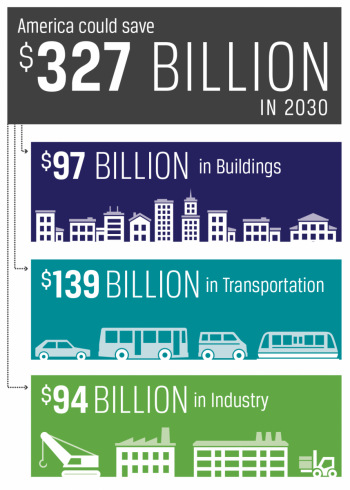Diverse Commission Unveils Plan to Double U.S. Energy Productivity
The Alliance to Save Energy News
Diverse Commission Unveils Plan to Double U.S. Energy Productivity
A diverse coalition of energy leaders unveil a set of recommendations designed to double U.S. energy productivity by 2030.
Chaired by U.S. Senator Mark Warner (D-Va.) and National Grid U.S. President Tom King, the Alliance Commission on National Energy Efficiency Policy calls for growing the U.S. economy through investments, modernization and education. These efforts will target the entire energy structure, including buildings, transportation, manufacturing, power generation and natural gas infrastructure.
"Doubling our energy productivity will yield huge returns for our economy and increase our competitiveness," Sen. Warner said. "This bipartisan plan can serve as a blueprint to advance energy efficiency and bring direct and tangible benefits to American families and businesses while building a stronger economy and healthier environment."
Meaningful Solutions
If adopted, by 2030 the U.S. could:
- Add 1.3 million jobs;
- Cut average household energy costs by more than $1,000 a year;
- Save American businesses $169 billion a year;
- Increase GDP by up to 2%;
- Decrease energy imports by more than $100 billion a year; and
- Reduce CO2 emissions by one-third.
"Stopping energy waste will help all Americans get the most out of their hard-earned income," said Alliance to Save Energy President Kateri Callahan. "By doubling productivity, we’ll wring more out of every dollar spent on energy, helping families improve the quality of their lives by freeing up money to either save or spend on other things."
The Energy 2030 plan maximizes energy productivity by expanding financing opportunities, reforming taxes and regulations, spurring innovation, strengthening standards, and building consumer awareness. The Commission also anticipates the plan will help the U.S. establish global leadership on energy efficiency.
Investment Yields Savings
Though the U.S. currently lags behind other nations on energy productivity, the Commission believes there are more than $1 trillion in energy-saving opportunities with the right federal, state and local government support, and private-sector buy-in.
"Our Energy 2030 plan goes well beyond capturing the more obvious energy efficiency benefits to uncover significant economic opportunities," said King. "The solutions will drive innovation and new technologies forward, improving and modernizing U.S. infrastructure and helping us to compete globally."
"Energy productivity is synonymous with economic prosperity and competitiveness," said former Republican New York Governor George Pataki. "This plan advances public-private partnerships to spur investment, and could save local, state and the federal governments $13 billion dollars in 2030 alone."
The diverse Commission is made up of leaders from the power sector, environmental groups, the financial community, manufacturing, transportation and government.
Moving the Energy 2030 Plan Forward
Work already has begun to turn the Commission’s recommendations into meaningful legislation.
The Alliance will collaborate with its 13 Honorary Congressional Vice Chairs to develop legislative proposals at the national level. Commission members will also discuss the recommendations with Obama Administration leaders at a White House meeting today. Finally, efforts to advance recommendations across the country at the local and state levels are to begin immediately.
Media Contact:
- Michael Timberlake; (202) 448-8758
STAY EMPOWERED
Help the Alliance advocate for policies to use energy more efficiently – supporting job creation, reduced emissions, and lower costs. Contact your member of Congress.
Energy efficiency is smart, nonpartisan, and practical. So are we. Our strength comes from an unparalleled group of Alliance Associates working collaboratively under the Alliance umbrella to pave the way for energy efficiency gains.
The power of efficiency is in your hands. Supporting the Alliance means supporting a vision for using energy more productively to achieve economic growth, a cleaner environment, and greater energy security, affordability, and reliability.

